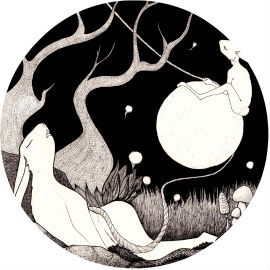This very ordinary little wooden plaque with tin triangle advertising the sale of watches played a role in saving hundreds of people’s lives in Haarlem during the Second World War.
During the period of the nazi occupation of Holland, the Ten Boom family ran a safe house above their clock and watch store. Their modest home housed not just the three members of the family, but six refugees. It was also a temporary way-station for more than 800 people, most of the Jews, trying to evade capture by the Germans. The Ten Boom family helped people find safe places to hide, provided food and identity cards – they did whatever they could to save people’s lives.
Unfortunately, they were eventually betrayed. On February 24, 1944, a man came to watch shop. He asked to speak to Corrie Ten Boom. Corrie was sick in bed, but she got up to meet with the man. The man told her that his wife had also been helping refugees, but she had been caught and was being held by the gestapo. He told Corrie that he could get her out if he could pay a 600 guilder bribe. Corrie agreed to find the money for him, and asked him to come back later in the afternoon.
Corrie gathered the money together and gave it to her sister, Betsy, before retiring to her sickbed once again. Both Betsy nor Corrie were suspicious about the man and his story, but they were determined to help everyone who asked for help. So, later in the day the man came to the door and knocked. Betsy looked through the little glass peep-window and saw him standing on the street. She also noticed something strange. Cars. Lots of cars. At that time in the Netherlands, people didn’t own cars. Only German soldiers. The Ten Booms had set up an alarm system, and an architect had built a hiding place for the six refugees hiding in their home. Betsy triggered the alarm and slowly – oh, so slowly – opened the door.
The six refugees stood in their hiding place. I can only imagine that they stood. The space, which is behind a false brick wall in Corrie’s bedroom, is less than a metre deep and maybe four metres wide. Just enough room for six people, a little water, a bucket and some dry crackers.
Downstairs in the dining room, the man revealed his betrayal. Gestapo soldiers entered the house. They searched everywhere for refugees but couldn’t find them. They did, however, find the Ten Booms stash of ‘extra’ ration cards and false identity cards. Enough evidence to arrest Betsy, Corrie and their elderly father.
Still, they wanted the refugees, so they determined to stay in the house for as long as it took to starve them out of hiding. The dining room is one of the lower rooms of the house, with a window onto the street. On the sill of this window, the Ten Booms usually sat the small wooden advertisement for Alpina watches. Nothing unusual for a family of horologists. But the sign was their signal to the world. When it was in the window, it was safe. If the sign was not visible, nazis were in the house.
Betsy saw the sign in the window – she had forgotten to take it down when the soldiers came in. She brushed past the sign, ‘accidentally’ knocking it to the floor. To her horror, however, one of the soldiers picked up the sign and set it back on the windowsill.
During the day that followed, more than 30 people came to the door, thinking it safe because the sign was in the window, and were arrested by the Gestapo.
The six people hiding in the hiding place were never found by the Gestapo. After two-and-a-half days standing in the dark, without food or water or blankets, listening to the soldiers tap at the walls listening for an echo, a cough, anything that would give them away, the four Jewish people and two resistance members snuck out. This was only possible because on that day, the soldiers sent two policemen to watch the house. Local police, who were friends of the Ten Booms: double agents.
I remember reading about Corrie Ten Boom when I was a little girl. I had a comic book version of her story, with colourful images of Corrie and Betsy living in their house in Haarlem, working with the Resistance, praying and holding bible study and, later, surviving for as long as they could in a concentration camp at Ravensbrück. Betsy, who was always more physically frail than her robust sister – did not survive the camp.
The Ten Booms were devout christians. Corrie – the only member of the family to survive the war and the camps – spent the rest of her life travelling the world and teaching forgiveness and faith. Visitors to the museum are treated to a one hour tour that includes a volunteer sharing the story of her life and her message. Although I can’t agree with her, I think it’s astonishing and admirable that Corrie could have lived through so much. Seen so much. And still have faith, still believe that, as she put it:
There is no pit so deep that God’s love is not deeper still.


No Comments